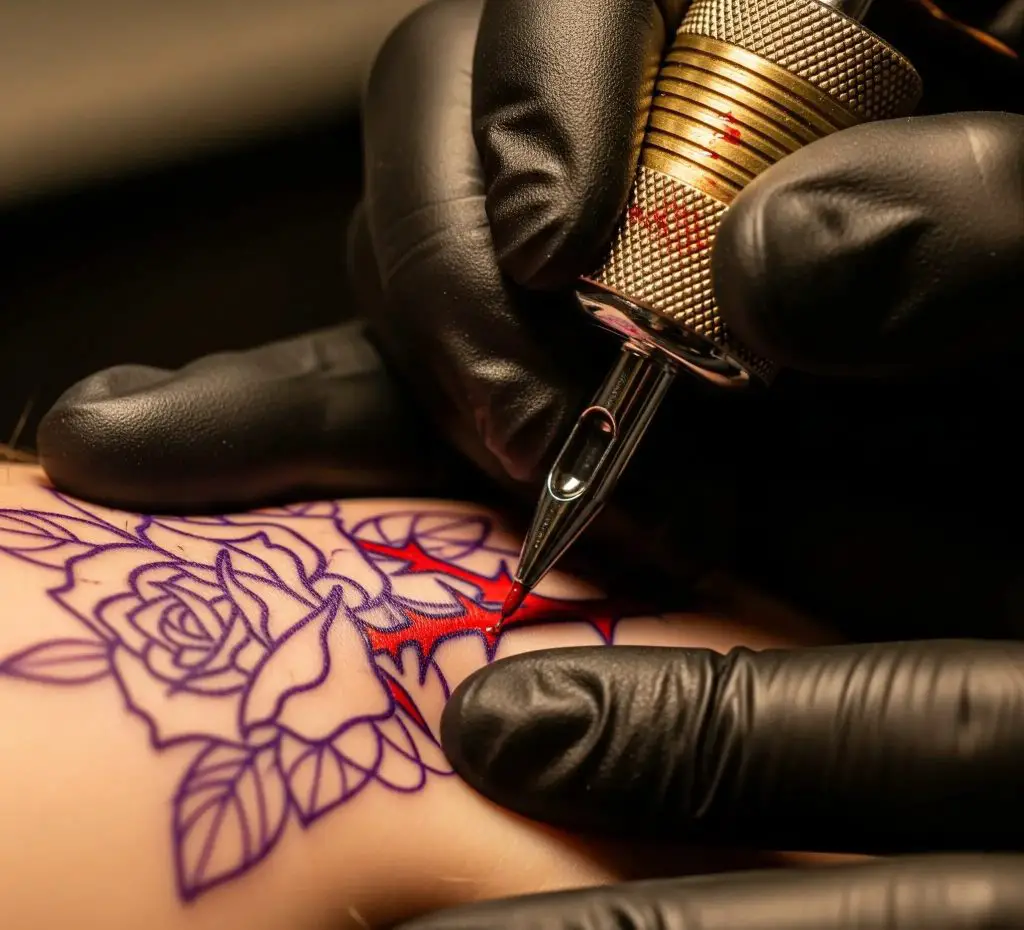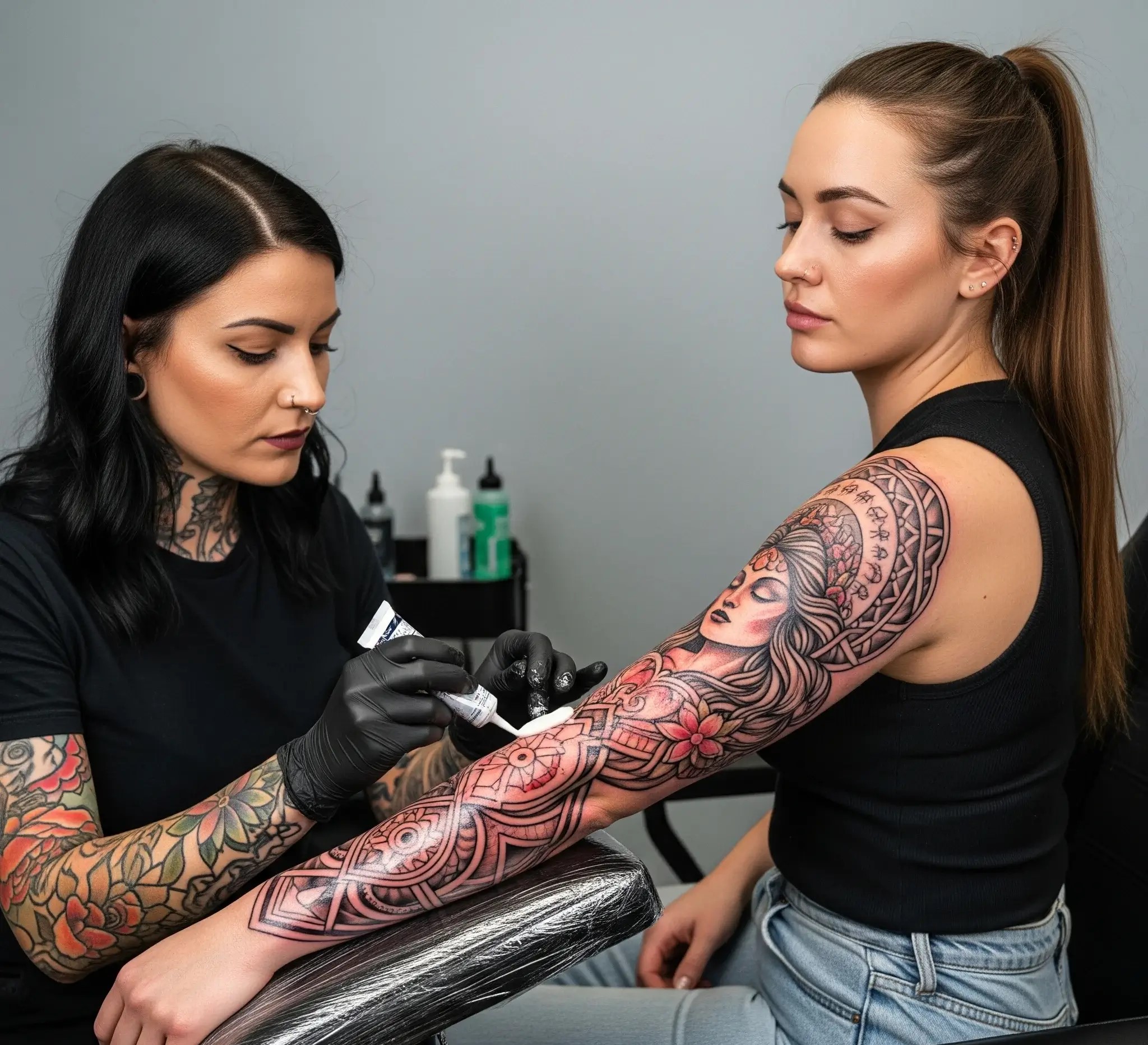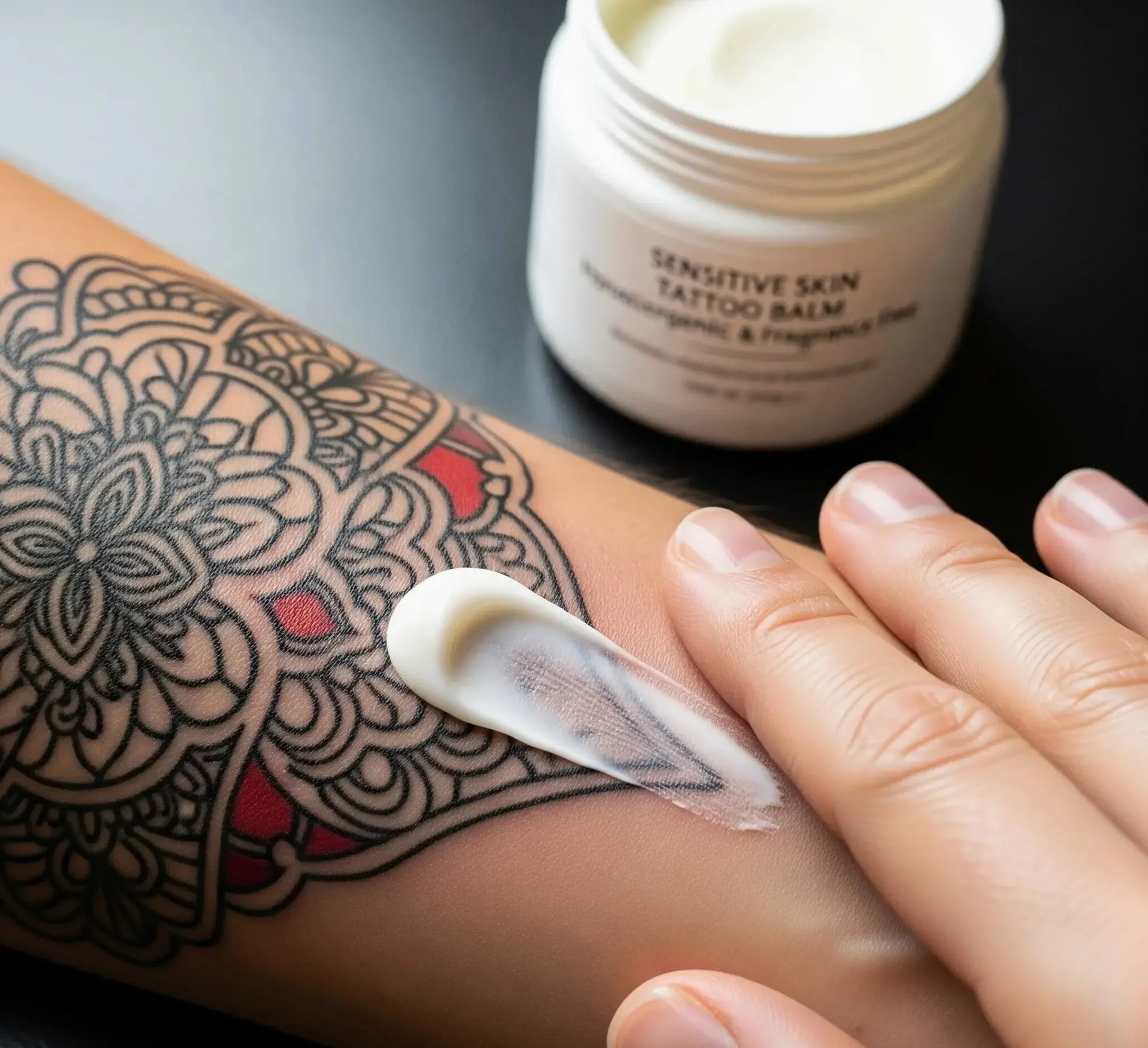Does your skin get red, itchy, or irritated even with the smallest change in products? If yes, getting a tattoo might feel a little scary.
Fresh ink already needs care, and when you have sensitive skin, that care becomes even more important. Without the right steps, you could end up with rashes, longer healing time, or even faded colors.
That’s why learning the right way to do Tattoo Aftercare For Sensitive Skin is the key to keeping both your skin and your tattoo safe.
Why Tattoo Aftercare Matters for Sensitive Skin
Aftercare is just as important as the tattooing process itself. Sensitive skin can easily become inflamed, itchy, or overly dry during healing. Without the right care, you risk:
- Excessive redness or rashes
- Slower healing times
- Possible allergic reactions
- Fading of the tattoo colors
Taking gentle, consistent steps ensures your tattoo heals beautifully while avoiding unnecessary discomfort.
Common Skin Reactions After Getting a Tattoo
Sensitive skin is more prone to visible reactions. Some common ones include:
- Redness and swelling: Normal at first but may last longer.
- Itchiness: More intense than in people with non-sensitive skin.
- Dry patches or peeling: Can happen if the area isn’t moisturized properly.
- Raised or bumpy areas: A stronger reaction to the tattoo needle.
Most of these reactions are temporary, but they require careful monitoring.
How Sensitive Skin Heals Differently?
Compared to regular skin, sensitive skin:
- Needs longer recovery time.
- Shows more irritation to even mild products.
- Reacts faster to scratching, rubbing, or tight clothing.
- Is more vulnerable to scarring if not handled properly.
Because of this, every step of aftercare should be done gently and with safe, skin-friendly products.

Best Cleansing Tips for Fresh Tattoos
Keeping your tattoo clean is the first step toward safe healing. For sensitive skin, the process should be simple:
- Wash your hands before touching your tattoo.
- Use lukewarm water, never hot.
- Choose a fragrance-free, mild cleanser (baby soaps or sensitive-skin washes are ideal).
- Gently pat dry with a soft towel—don’t rub.
Doing this twice a day is usually enough to prevent bacteria without stripping natural oils.
Moisturizers That Work Well for Sensitive Skin
Moisturizing keeps your tattoo from drying out, but sensitive skin needs extra care with product selection. Look for:
- Fragrance-free lotions
- Hypoallergenic creams
- Petroleum-based ointments in thin layers
Avoid heavy or greasy creams that clog pores. Apply just enough to keep the tattoo soft without smothering it.
Ingredients to Avoid in Tattoo Aftercare Products
Sensitive skin often reacts to chemicals that others may tolerate. Steer clear of:
- Alcohol-based cleansers
- Lotions with perfumes or dyes
- Harsh exfoliants like scrubs or acids
- Antibiotic ointments with strong additives
Always read labels carefully before applying anything new.
How to Reduce Redness and Irritation?
Some redness is normal, but sensitive skin can flare up more intensely. To calm irritation:
- Apply a thin, fragrance-free moisturizer
- Use a cold compress (wrapped in a clean cloth)
- Keep the area away from tight clothing
- Avoid scratching or picking at scabs
This helps your tattoo heal evenly without prolonged discomfort.
Showering and Bathing Guidelines for Sensitive Skin
Water care is essential for tattoo healing:
- Take short, lukewarm showers
- Don’t soak in bathtubs, pools, or hot tubs
- Avoid harsh soaps, scrubs, or loofahs on the tattoo
- Pat dry instead of rubbing with a towel
Too much water exposure can cause fading or infection.
Sun Protection Tips for New Tattoos
The sun is one of the biggest threats to fresh tattoos, especially on sensitive skin. Protect your ink by:
- Keeping it covered with loose clothing outdoors
- Avoiding sunscreen on a new tattoo until it’s fully healed
- Once healed, using a broad-spectrum, fragrance-free SPF 30+ sunscreen
This prevents fading, irritation, and unnecessary damage.
Clothing Choices That Prevent Skin Irritation
What you wear affects healing more than you think. Choose:
- Loose, breathable fabrics like cotton
- Avoid tight waistbands or straps rubbing on the tattoo
- Stick to soft materials that don’t trap sweat
Good clothing choices help prevent rashes and allow your skin to breathe.

When to Use Cold Compresses on Sensitive Skin?
Cold compresses can reduce swelling and itching. Best practices include:
- Wrap ice in a clean towel (never apply directly)
- Use for 5–10 minutes at a time
- Repeat a few times a day if needed
This method soothes irritation without harming your tattoo.
Signs of Infection or Allergic Reaction
Sensitive skin can blur the line between normal healing and a problem. Watch for:
- Spreading redness beyond the tattoo area
- Severe itching or blistering
- Yellow or green discharge
- Fever or chills
If these appear, contact a doctor or dermatologist right away.
Natural Remedies That May Help Sensitive Skin Heal
Some natural solutions may soothe sensitive skin during tattoo healing, such as:
- Aloe vera gel (pure, fragrance-free)
- Coconut oil (in moderation)
- Chamomile compresses for calming irritation
Always patch-test first to avoid unexpected reactions.
Tattoo Aftercare Mistakes to Avoid
Many people unknowingly slow down their healing. For sensitive skin, avoid:
- Overwashing your tattoo
- Using scented lotions or perfumes
- Scratching, peeling, or picking at scabs
- Wearing tight or sweaty clothes on the tattoo
- Sunbathing or swimming too early
Being mindful of these mistakes keeps your tattoo safe and vibrant.
When to Contact a Dermatologist or Tattoo Artist?
Sometimes extra help is needed. Reach out if you:
- Notice signs of infection
- Have constant burning or itching
- See your tattoo colors fading too quickly
- Experience swelling that doesn’t improve
Dermatologists can treat skin reactions, while tattoo artists can guide you on safe aftercare adjustments.
Final Thoughts
Tattoo aftercare for sensitive skin requires patience, gentle products, and a little extra attention.
By choosing fragrance-free cleansers, light moisturizers, and protective habits, you’ll help your tattoo heal smoothly without unnecessary irritation.
Taking the right steps early on ensures your ink stays bold, your skin stays healthy, and the healing process feels a lot more comfortable.
Read More Blogs:
- 14 Hawk Tattoo Ideas With Deep And Powerful Meaning
- 12 Creative And Fun Opossum Tattoo Ideas To Try
- 13 Elbow Tattoos For Women That Look Stunning & Bold
- 12 Beautiful Daughter Tattoo Ideas That Show Endless Love
- How Do You Make Homemade Tattoo Ink With A Pencil?
- 15 Raccoon Tattoo Designs That Are Cute And Creative
- 15 Stunning Bat Tattoo Ideas You’ll Want To Try Right Now
- 13 Hairstylist Tattoos That Show Your Love For The Craft
- 13 Stunning Jasmine Tattoo Ideas With Deep Meanings To Try
- 13 Stunning Pothos Tattoo Designs For Plant Lovers
- 12 Best Rengoku Tattoo Designs Every Demon Slayer Fan Will Love
- 12 Autumn Tattoo Designs That Capture Cozy Fall Vibes
- 15 Red Cardinal Tattoo Ideas That Look Stunning On Skin
